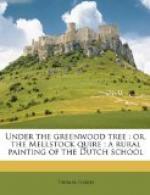“No; I went to Charmley. Poor John Dunford chose me to be one of his bearers a long time before he died, and yesterday was the funeral. Of course I couldn’t refuse, though I should have liked particularly to have been at home as ’twas the day of the new music.”
“Yes, you should have been. The musical portion of the service was successful—very successful indeed; and what is more to the purpose, no ill-feeling whatever was evinced by any of the members of the old choir. They joined in the singing with the greatest good-will.”
“’Twas natural enough that I should want to be there, I suppose,” said Dick, smiling a private smile; “considering who the organ-player was.”
At this the vicar reddened a little, and said, “Yes, yes,” though not at all comprehending Dick’s true meaning, who, as he received no further reply, continued hesitatingly, and with another smile denoting his pride as a lover—
“I suppose you know what I mean, sir? You’ve heard about me and—Miss Day?”
The red in Maybold’s countenance went away: he turned and looked Dick in the face.
“No,” he said constrainedly, “I’ve heard nothing whatever about you and Miss Day.”
“Why, she’s my sweetheart, and we are going to be married next Midsummer. We are keeping it rather close just at present, because ’tis a good many months to wait; but it is her father’s wish that we don’t marry before, and of course we must submit. But the time ’ill soon slip along.”
“Yes, the time will soon slip along—Time glides away every day—yes.”
Maybold said these words, but he had no idea of what they were. He was conscious of a cold and sickly thrill throughout him; and all he reasoned was this that the young creature whose graces had intoxicated him into making the most imprudent resolution of his life, was less an angel than a woman.
“You see, sir,” continued the ingenuous Dick, “’twill be better in one sense. I shall by that time be the regular manager of a branch o’ father’s business, which has very much increased lately, and business, which we think of starting elsewhere. It has very much increased lately, and we expect next year to keep a’ extra couple of horses. We’ve already our eye on one—brown as a berry, neck like a rainbow, fifteen hands, and not a gray hair in her—offered us at twenty-five want a crown. And to kip pace with the times I have had some cards prented and I beg leave to hand you one, sir.”
“Certainly,” said the vicar, mechanically taking the card that Dick offered him.
“I turn in here by Grey’s Bridge,” said Dick. “I suppose you go straight on and up town?”
“Yes.”
“Good-morning, sir.”
“Good-morning, Dewy.”
Maybold stood still upon the bridge, holding the card as it had been put into his hand, and Dick’s footsteps died away towards Durnover Mill. The vicar’s first voluntary action was to read the card:—




